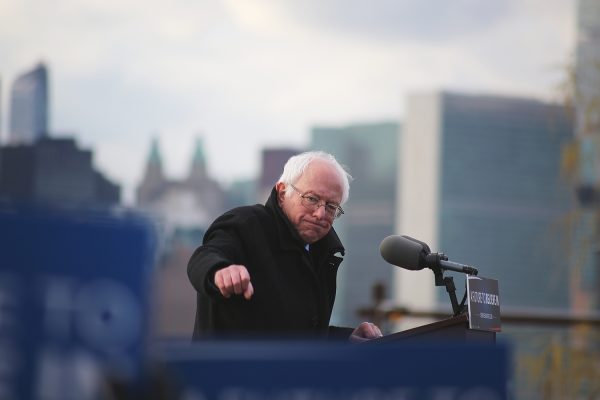
Why is the Democratic Party establishment in the United States scared of Bernie Sanders? Polls suggest the socialist from Vermont would do about as well against Donald Trump in a general election as his rival, Joe Biden.
I suspect there are three reasons:
- Democrats don’t trust the polls.
- They worry that, even if Sanders might defeat Trump, he would hurt down-ballot Democrats.
- They don’t want their party to be taken over by an outsider, like the Republican Party was in 2016.
Trust in the polls
Polls six months out from an election aren’t super reliable. At this point in 2016, Hillary Clinton was polling at 40-42 percent and Trump at 34-38. Clinton eventually lost the election with 48 percent support to Trump’s 46 percent. (The Republican prevailed in the Electoral College.)
Sanders may be fairly well-known (he ran against Clinton in 2016), but only in the last couple of weeks have sympathetic remarks he made decades ago about far-left dictatorships in Cuba and Nicaragua come to light. Democrats worry the Trump campaign will portray Sanders as a far-left extremist — and that has been an effective Republican strategy in the past.
Richard Nixon called George McGovern a defeatist and won 49 states. Ronald Reagan argued Walter Mondale would return to the failed economic policies of the 1970s and won 49 states. George H.W. Bush characterized Michael Dukakis as a “Massachusetts liberal” and won forty states.
Sanders’ supporters argue times have changed. The Cold War is over. Socialism doesn’t poll as poorly as it once did. More and more Americans are asking why, if Europeans can have free health care and affordable education, can’t they?
Besides, when the party nominated a centrist in 2016, she didn’t win either.
Party leaders, many of whom are old enough to remember the McGovern, Mondale and Dukakis candidacies, and many of whom became active in politics during the presidency of Bill Clinton — who won twice by appealing to voters in the center — aren’t convinced this time is different.
Down-ballot candidates
Even if centrist and center-right swing voters, who supported Mitt Romney in 2012 and backed Clinton and the Democrats in 2016 and 2018, are willing to vote for a candidate who wants to take away their health insurance, raise their taxes, decriminalize unsanctioned border crossings and give prisoners the right to vote, because they would support anyone to get rid of Trump, Democratic lawmakers, governors and party officials worry those same voters might be tempted to split their ballots and return Republicans to Congress to prevent a President Sanders from getting much done.
That would put the Democratic majority in the House of Representatives at risk, and it would make it that much harder for Democrats to win a majority in the Senate.
Polls suggest Democrats could defeat Senators Martha McSally of Arizona, Cory Gardner of Colorado, Susan Collins of Maine and Thom Tillis of North Carolina. They have to. The outcome in those four states will probably decide who controls the Senate.
Hostile takeover
When Trump launched his hostile takeover of the Republican Party in 2016, reversing its long-held positions on everything from family values to trade to relations with Russia, Republicans put up little resistance.
Some, like Romney, spoke out, but most elected and party officials refused to intervene. Some delegates mounted a last-ditch effort to stop Trump at the convention, but they were overruled by national party leaders. Some conservative opinionmakers — Never Trumpers — refused to support a would-be strongman, but it turned out they had less influence than far-right blogs and talk-radio hosts. The theory that “the party decides”, by nudging voters toward the candidate who is both the most electable and best represents the party’s interests, looked out of date.
Democrats are giving it a new lease on life. In the last few days, Biden has taken a commanding lead in the endorsement primary, which is a good indicator of internal party support. Congressman Jim Clyburn, the third-ranking Democrat in the House of Representatives, endorsed Biden days before the South Carolina primary, which Biden won decisively. 61 percent of voters said Clyburn’s endorsement factored into their decision.
As many as 26 prominent Democrats have thrown their support behind the former vice president since then, including Pete Buttigieg and Amy Klobuchar, who both ended their presidential bids a day before the Super Tuesday primaries; former 2020 hopeful Beto O’Rourke, 2016 vice presidential candidate Tim Kaine, and former Senate leader, and Nevada party boss, Harry Reid.
Former president Jimmy Carter seems to have persuaded Buttigieg to drop out and endorse Biden over breakfast.
That is the sort of thing you would expect to happen in a functioning political party.
The Democratic Party is not a vehicle for people who want to be president. It is a network of factions and interest groups, who are constantly bargaining and negotiating among themselves to get their policies to the top of the agenda. Sanders and his movement have every right to be one of those factions; they are not entitled to take over the whole party because their man has so far won 25 percent support from primary voters.
